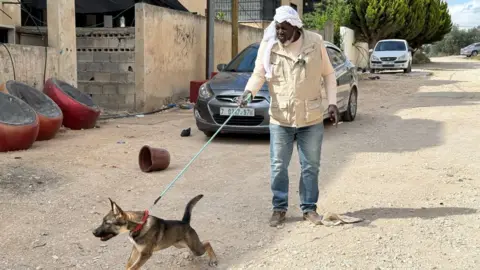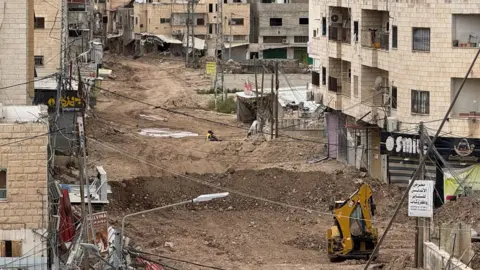'I saved my ID card and my dog': Israel expands demolitions of West Bank refugee homes

On the night Israeli forces entered Jenin refugee camp in the occupied West Bank and began ordering its 20,000 Palestinian residents to leave their homes, 66-year-old Jumaa Zawayda said he would refuse.
"My family all left but I told them I had to stay, if Israeli forces come to raid our house I want to be there to stop it being damaged."
What followed was three days of fear, with the constant sound of gunfire, explosions and drones flying through the neighbourhood, and issuing of orders that Jumaa couldn't make out amid the noise. Then water and electricity was cut off, his phone ran out of battery and Jumaa felt he could no longer stay.
Now, three months later, Jumaa is standing on a hill in Jenin city, looking out over the ghost town of the refugee camp to which he and the other residents are still prevented from returning by the Israeli military.
He's trying to see if his home is one of the many destroyed by the Israeli forces during their operations against Palestinian armed groups that were present in the camp. The sound of ongoing explosions can be heard below.
"Some people have told me they think our building was demolished, but we don't know for certain," says Jumaa, struggling to express himself through his emotion.
The father of nine, who used to work in construction, stayed for three months in a school-turned-shelter for the camp's displaced residents. He has now moved into accommodation for university students that he shares with his brother.
Before the outbreak of the war in Gaza in October 2023, Israel was already engaged in a military campaign against armed groups in the West Bank.
A number of groups emerged in the densely-populated urban refugee camps created for Palestinians who fled or were expelled from their homes during the war that followed the creation of the state of Israel in 1948.
The main groups in Jenin camp are affiliated to Palestinian Islamic Jihad and Hamas. Their fighters have mostly attacked Israeli military forces, alongside sporadic attacks on Israeli settlers in the West Bank.
The number of fighters is unknown but local journalists estimate that there were around 150 fighters in Jenin camp prior to the recent operations by both Israel and the Palestinian Authority.
The Palestinian Authority, which governs parts of the West Bank, launched its own crackdown in Jenin camp in December 2024 and its forces only withdrew when the Israeli military began its major operation there in January.
Israel's defence minister has called the camps "nests of terror" and in January stepped up its campaign against the armed groups operating inside them – entering and blockading a number of refugee camps in the northern West Bank that are home to tens of thousands of Palestinians.
It ordered residents to leave and began a wave of building demolitions, while giving some residents brief opportunities to gather belongings.

But with Israel almost entirely blocking access to the camps and not publicly announcing which buildings they've destroyed, many Palestinians are distraught about whether they have a home to return to.
The UN's Palestinian refugee agency Unrwa says its best estimate is that Israel has razed at least 260 buildings containing around 800 apartments during "Operation Iron Wall", focusing on three refugee camps in the north of the West Bank: Jenin, Tulkarem and Nur Shams. Unrwa estimates that 42,000 Palestinians have been displaced from the camps since January.
In February, the Israeli military announced it had killed 60 fighters in its operations and arrested 280 others. Meanwhile Palestinian health officials say 100 people have been killed in the West Bank since the start of Israel's January operation until today.
Defence Minister Israel Katz said the army was destroying weapons and infrastructure "on an extensive scale" and said he had instructed the military to remain in the refugee camps for a year and prevent residents returning there.
The Israeli military told the BBC that the militias "exploit the civilian population as human shields and endanger them by planting explosive devices and hiding weapons".
On 1 May, Israel gave Palestinian officials in the West Bank a new map of 106 buildings it said it would demolish in Tulkarem and Nur Shams refugee camps in the next 24 hours for "military purposes". It said residents could apply for a brief window to return home to retrieve essential belongings.
Aid agencies say that Israel's campaign has caused the largest forced displacement of Palestinians in the West Bank in decades.
"What's happening is unprecedented," says Roland Friedrich, Unrwa's West Bank director.
"In terms of the number of displaced people and the level of destruction, we've never seen anything like it since 1967," he added, referring to the year Israel began its military occupation of the West Bank.

While filming an interview with the mayor of Jenin, the BBC witnessed Israeli forces detain several Palestinians, including municipality workers who were attempting to enter the camp in order to clear a route to a nearby hospital. They were kept for three hours before being released.
"There are big challenges, in terms of providing services to citizens. As everyone knows, the infrastructure in Jenin camp has been totally demolished," says Mayor Mohammad Jarrar.
"Israel's goal is to try to make Jenin camp totally unfit to live in, and I'm telling you it has now become completely unliveable."
Israel's blockade of West Bank refugee camps has made establishing information about what is happening inside nearly impossible, says Unrwa's Roland Friedrich, including the exact extent of demolitions.
Jumaa is among some of the displaced Palestinians who were granted a brief visit home by Israeli forces in order to retrieve belongings. He was able just to grab his UN ID card and the family dog. Then two months later, in March, Israel issued a map of over 90 buildings it identified for demolition in Jenin. Jumaa's residence looked to be among them.
The Israeli military told the BBC that it was necessary to demolish these buildings in order to improve "freedom of movement" for its forces, but did not confirm whether Jumaa's home was indeed destroyed.
The BBC has compared Israel's March demolition map to satellite imagery of Jenin taken a week later. We have been able to confirm that, by 27 March, at least 33 buildings on the list, including Jumaa's, were destroyed. Satellite imagery reveals many further demolitions have taken place since January, including the construction of new roads by Israeli forces where buildings previously stood.
"Why did they demolish my house? I want to know. I want the Israeli army to give me justification. I had no links to militants. I'm a peaceful person," says Jumaa.
"I worked job to job for 50 years to build my home."
Despite learning that his house was demolished, Jumaa remains insistent that he will return home.
"I won't leave the camp. If they won't let me rebuild my house, I will set up a tent in its place," he said.
"Isn't it enough that my family were displaced in 1948, now we must face displacement again?"
BBC





